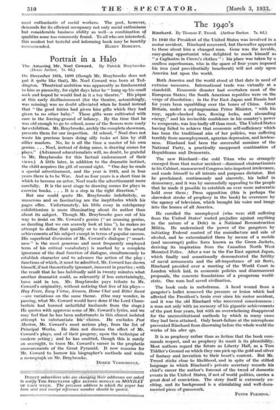Portrait in a Halo
The Amazing Mr. Noel Coward. By Patrick Braybrooke- (Denis Archer. 7e. 6d.) . .
ON December 16th, 1899 (though Mr. Braybrooke does not put it quite like that), Mr. Noel Coward was born at Ted- dington. - Theatrical ambition was apparently 'as fundamental to him as precocity, for eight days later he " hung up his small sock and hoped he would find in it a toy theatre." Hispique at this early disillusionment (for the theatre, astonishingly, was missing) was no doubt alleviated when he found instead that " the good fairies had given him gifts which they had given to no other baby." These gifts were cultivated with care in the forcing-ground of infancy. By the time that he was old enough to go to school, some of the flowers were ready for exhibition. Mr. Braybrooke, archly the complete showman, presents them for our inspection. At school, " Noel does not waste his precious hours doing silly tasks set him by still sillier masters. No, he is all the time a master of his own genius. . . . Noel, instead of doing sums, is drawing scenes for plays." (Advanced educationalists will, no doubt, be grateful to Mr. Braybrooke for this factual endorsement of their views.) A little later, in addition to the dramatic instinct, the child acquires the gift of second sight. " One day he reads a special advertisement, and the year is 1910, and in four years there is to be War. And as four years is a short time in which to become an actor, Noel reads the advertisement more carefully. It is the next stage to drawing scenes for plays in exercise books. . . . It is a step in the right direction." But one could quote Mr. Braybrooke indefinitely, so numerous and so 'fascinating are the ineptitudes which his pages offer. Unfortunately, his little essay in catchpenny exhibitionism is more illuminating about its author than about its subject.. Though Mr. Braybrooke goes out of his way to insist on Mr. Coward's genius (" an amazing genius, so dazzling that we can scarcely look at him, he _makes no attempt to define that quality or to relate it to the actual achievements of hiS subject except in terms of popular success. His superficial discussion of Mr. Coward's dialogue (" smart- ness " is the most generous and most frequently employed term of his critical vocabulary) is marked by a complete ignorance of the dual function of dialogue, simultaneously to establish character and to advance the action of the play :. functions of which, it must be admitted, Mr. Coward has shown ' himself, not theoretically ignorant, innocent in practice ; with t the result that he has habitually said in twenty minute's what, another dramatist could, as televantly if less entertainingly, have said in ten. Mr. Braybrooke, pays tribute to Mr. Coward's originality, without noticing that five of his plays— Hay Fever, Easy Virtue, Sirocco, Home Chat and Bitter Sweet —are variations on the same theme. (One may wonder, in passing, what Mr. Coward would have done if the Lord Cham- berlain bad banned unfaithful husbands from the stage.) He quotes with approval some of Mr. Coward's lyrics, and we may feel that he has been unfortunate in this alniost isolated , attempt to substantiate his He excludes Post Mortem, Mr. Coward's most Serious play, from the list of Principal Works. He 'office not discuss the effect of Mr. Coward's plays, and of their progeny, upon the technique of
modern acting'; 'and' he has omitted, though this is surely an oversight, to trace Mr. Coward's career in the proPhetic measurements of the Great Pyramid. It now remains for Mr. Coward to borrow his biographer's methods and write a monograPh Mr.Hraybrooke.
DEREK VERSCIIOYLE.


















































 Previous page
Previous page